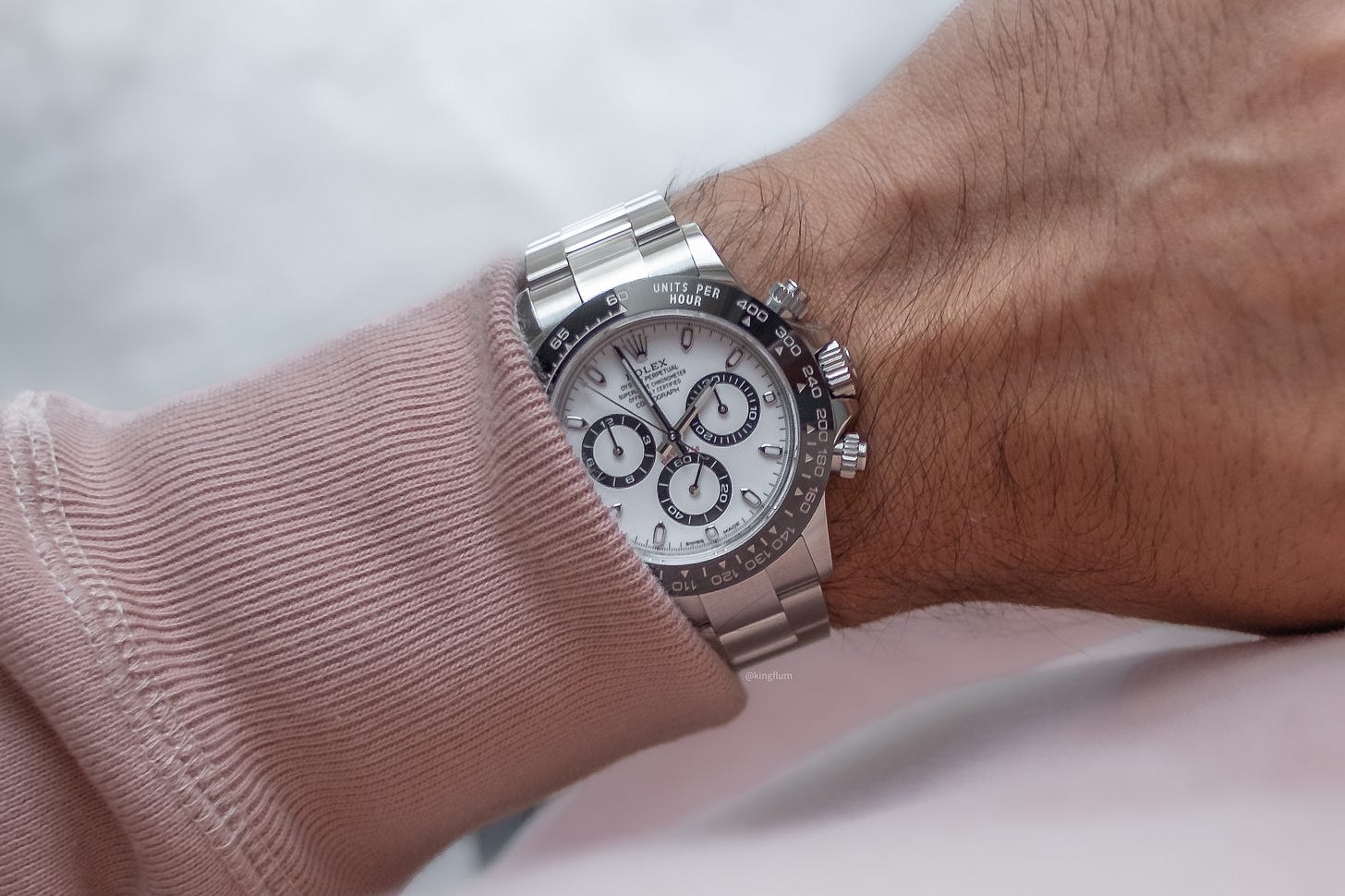How to think
If you want to improve your thinking, you've got to spend some time thinking!
It has been a while since my last post... and in this case, the connection to watches doesn't extend beyond anything I have said before. The topic of thinking itself, is something I haven't previously addressed explicitly, though I have probably talked around it in several ways. So here's a first attempt!
Nearly every adult is required to make decisions on a regular basis. Most may not even realise they’re doing it, particularly when they’re using some form of pre-programmed neural pathway. Even a basic concept such as deciding what to wear in the morning will require some critical thinking and reasoning skills… we take several factors into consideration such as the weather forecast; your plans for the day (where are you going? who will you see?); your comfort level (will you be walking around a lot, or sedentary) and so on.
Thus, we are already critical thinkers on some level. Our lives are of course, more complicated, and we face decisions that are much more difficult than choosing what to wear. How do we handle conflict, or approach problem solving? How do we deal with a crisis, or address moral and ethical dilemmas?
“If you want others to follow, learn to be alone with your thoughts.”
"Solitude and Leadership" - delivered by William Deresiewicz to the plebe class at the United States Military Academy at West Point in October 2009 - originally published in The American Scholar.
The ability to critically think through problems, is one of the most difficult things to master… and in my experience at least, requires re-mastering in different contexts as we find ourselves in new situations. One problem I observe, is that schools aren’t really geared towards teaching a method of thinking. Ways of thinking can of course be learned, but aren’t as easy to be taught. I often notice how engineers have a better 'tuned' approach to thinking… but I digress.
So how do we learn to think, or improve our ability to think? After all, the purpose of figuring this out is simple... mastery of thinking, leads to mastery of time. If we attempt to do more while thinking less, we're likely to make more mistakes... these will need to be corrected, and this takes up more time. If we think more, and do less, we are less likely to get things wrong, and as a result, we will save ourselves from having to correct things.
Let's take a closer look at Solitude and Leadership - worth reading the whole essay when you get a chance, but here's the key bit around thinking:
How do you learn to think? Let’s start with how you don’t learn to think. A study by a team of researchers at Stanford came out a couple of months ago. The investigators wanted to figure out how today’s college students were able to multitask so much more effectively than adults. How do they manage to do it, the researchers asked? The answer, they discovered—and this is by no means what they expected—is that they don’t. The enhanced cognitive abilities the investigators expected to find, the mental faculties that enable people to multitask effectively, were simply not there. In other words, people do not multitask effectively. And here’s the really surprising finding: the more people multitask, the worse they are, not just at other mental abilities, but at multitasking itself.
One thing that made the study different from others is that the researchers didn’t test people’s cognitive functions while they were multitasking. They separated the subject group into high multitaskers and low multitaskers and used a different set of tests to measure the kinds of cognitive abilities involved in multitasking. They found that in every case the high multitaskers scored worse. They were worse at distinguishing between relevant and irrelevant information and ignoring the latter. In other words, they were more distractible. They were worse at what you might call “mental filing”: keeping information in the right conceptual boxes and being able to retrieve it quickly. In other words, their minds were more disorganized. And they were even worse at the very thing that defines multitasking itself: switching between tasks.
Multitasking, in short, is not only not thinking, it impairs your ability to think. Thinking means concentrating on one thing long enough to develop an idea about it. Not learning other people’s ideas, or memorizing a body of information, however much those may sometimes be useful. Developing your own ideas. In short, thinking for yourself. You simply cannot do that in bursts of 20 seconds at a time, constantly interrupted by Facebook messages or Twitter tweets, or fiddling with your iPod, or watching something on YouTube.
I find for myself that my first thought is never my best thought. My first thought is always someone else’s; it’s always what I’ve already heard about the subject, always the conventional wisdom. It’s only by concentrating, sticking to the question, being patient, letting all the parts of my mind come into play, that I arrive at an original idea. By giving my brain a chance to make associations, draw connections, take me by surprise. And often even that idea doesn’t turn out to be very good. I need time to think about it, too, to make mistakes and recognize them, to make false starts and correct them, to outlast my impulses, to defeat my desire to declare the job done and move on to the next thing.
I used to have students who bragged to me about how fast they wrote their papers. I would tell them that the great German novelist Thomas Mann said that a writer is someone for whom writing is more difficult than it is for other people. The best writers write much more slowly than everyone else, and the better they are, the slower they write. James Joyce wrote Ulysses, the greatest novel of the 20th century, at the rate of about a hundred words a day—half the length of the selection I read you earlier from Heart of Darkness—for seven years. T. S. Eliot, one of the greatest poets our country has ever produced, wrote about 150 pages of poetry over the course of his entire 25-year career. That’s half a page a month. So it is with any other form of thought. You do your best thinking by slowing down and concentrating.
So his point is simple - if you want to improve your thinking, you've got to spend some time thinking! This makes a lot of sense to me, and I find this manifesting itself in my writing here as well. I haven't posted a blog post in a while, and that's largely because I haven't actually had much time to pause, and formulate any thoughts worth sharing.
“It’s only by concentrating, sticking to the question, being patient, letting all the parts of my mind come into play, that I arrive at an original idea. By giving my brain a chance to make associations, draw connections, take me by surprise”
William Deresiewicz
How does this relate to watches?
I'm inclined to suggest that the answer is as straightforward as it seems... just take time to think about your collection! Consider each purchase (and potentially, each accompanying sale) both in terms of the individual pieces, but also in terms of your overall collection.
Some of the ways I evaluate sales and purchases are according to complications (do I need more than one chronograph?), versatility (do I have a waterproof watch for a particular occasion?) and similarity to other watches (do I need another watch with a blue dial?). After this broad-based approach, there will be sub-categories such as historical significance (e.g. the Daniel Roth Lemania in my Breguet), or rarity and ease-of-replacement if I decide I want to buy it back again (e.g. a swiss-only dial in a Rolex) ... these things matter too, because even though you might not wear a piece as often as it 'deserves', you still feel like you want to keep it for whatever reason. That's fine, just give it the thought it deserves.
When it comes to watches, our internal dialogue is personal and often irrational, and I know folks who can't get enough of a particular complication, or colour and so on... I am the opposite, where I try and find ONE watch to suit as many scenarios as possible, because my ongoing intent is to minimise the size of the collection. Others might be the opposite, and prefer to have every colour of every reference - and if your pockets are deep enough to allow this, who's to say that is a bad idea? :)
A brief chat with @watchthetime reminded me of this post about decision making - and I think it is worth reading it again. While we take time to think, we should not be so naïve to believe that we can think in a vacuum - our thoughts are always going to be influenced by external factors and that post helps with reducing our own systematic errors of judgment.
There are no right answers... we all have unique journeys... Hope this was useful in some way. If you liked the post, hit the heart below - and I am always keen to hear your feedback and reflections - so hit me up below, or on Insta.
F



